

Www.nasponline.org/families/documents/Family_School_Partnerships.pdf. Talking to Your Child's Teacher. There are two types of conversion you could have with your child’s teacher: a short discussion over a relatively simple, minor thing; or a more in-depth discussion over an on-going issue or something more serious, which will usually require an appointment with the teacher.
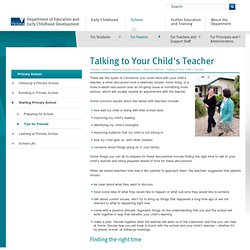
What Teachers Want to Tell Parents. As far as life-changing events go, there’s no doubt that having my children changed me in an instant.
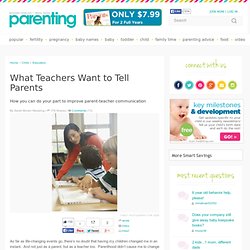
And not just as a parent, but as a teacher too. Parenthood didn’t cause me to change my teaching philosophy or create new classroom procedures, but it did give me a valuable perspective. Immediately, I understood the implicit hope that the world would be good and just and full of opportunity for my children. I also understood, viscerally, what parents need from teachers: to recognize the infinite potential in each student, even when he can’t see it in himself; to know that fair and equal aren’t the same; and to be fully present with the children we work with.
Yet, as a person who has met and talked with tens of thousands of teachers from across the country, I also know that teachers can’t do this work alone. What parents don’t want to hear at parent-teacher conferences. When my wife and I sat down at our daughter’s 5th grade parent-teacher conference last week, we hoped to get a sense that the teacher understood our daughter and her strengths and weaknesses.
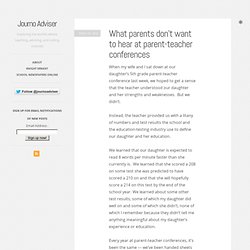
But we didn’t. Instead, the teacher provided us with a litany of numbers and test results the school and the education-testing industry use to define our daughter and her education. We learned that our daughter is expected to read 8 words per minute faster than she currently is. We learned that she scored a 208 on some test she was predicted to have scored a 210 on and that she will hopefully score a 214 on this test by the end of the school year. We learned about some other test results, some of which my daughter did well on and some of which she didn’t, none of which I remember because they didn’t tell me anything meaningful about my daughter’s experience or education. Never once have we paid attention to the speed at which she’s reading. Parent involvement in learning, not just fundraising, improves children's achievements.
Search - #ozptchat. 5 Things Teachers Want Parents to Know. Every year, when I drive to work on the first day of school, I cross paths with families on their way to new beginnings. Most are not heading to my classroom, but they could be. I see the emotion and expectation on their faces -- kids who are anxious about their new classes and parents, quietly hoping that that their child will be understood, nurtured and appreciated. 12 Conversation Starters on What Parents Want You (Teachers) to Know.
Earlier this year, I came across an article by Eric Sheninger entitled, "Seven Things Teachers Want You (Parents) to Know.
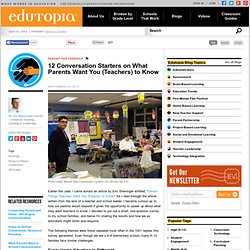
" As I read through the article written from the lens of a teacher and school leader, I became curious as to how our parents would respond if given the opportunity to speak up about what they want teachers to know. I decided to put out a short, one-question survey to my school families, and below I'm sharing the results and how we as educators might listen and respond. The following themes were those repeated most often in the 100+ replies this survey generated. Even though we are a K-6 elementary school, many K-12 families face similar challenges.
Every Home Situation is Different. Www.ascd.org/ASCD/pdf/journals/ed_lead/el_198910_lindle.pdf. 10 things teachers want to say to parents, but can't. 1 Your kids are not your mates Something I'm starting to hear with worrying frequency within the primary school setting is "my daughter's my best friend".
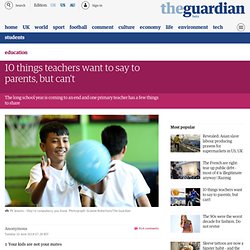
Often, this rings alarm bells. Your kids aren't your mates. You're their parent, and your responsibility is to provide them with guidance and boundaries, not to drag them into your own disputes. Your nine-year-old doesn't need to know about your bitter feud with his friend's mother, or which dad you've got the hots for at the school gate. 2 Data levels aren't everything Here's one to think about for the start of next term. 3 Let them go a little bit It's always tricky to bring up, as it's the child who dictates when this needs to happen. 4 Video games carry certificates for a reason I'm sure that XBox keeps your nine-year-old nice and quiet at home. 5 John Terry is no role model Ticking off a child for low-level disruption occurs at least daily for most teachers; it's part of the job. 6 Boyfriends can wait.
What parents really want to say to teachers when they meet. Getty Recently, we asked teachers what they'd like to say to parents.
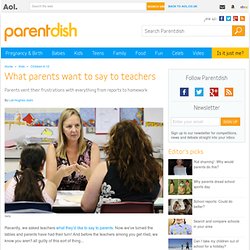
Now we've turned the tables and parents have had their turn! And before the teachers among you get riled, we know you aren't all guilty of this sort of thing... What Do Parents Really Want From Teachers? Resources >> Browse Articles >> Partnering with Parents Featured Author: Natalie Schwartz Natalie Schwartz is the author of The Teacher Chronicles: Confronting the Demands of Students, Parents, Administrators and Society (Laurelton Media).
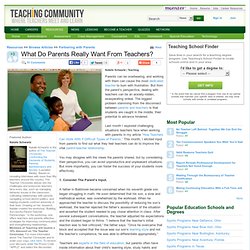
Based on revealing interviews with more than fifty teachers around the country, The Teacher Chronicles delves into the challenges and pressures teachers face every day, such as managing behavior issues in the classroom, cultivating relationships with parents, navigating school district politics, and helping students confront adversity in their lives. Drawing on her research, Natalie created the workshop “Building Successful Parent-Teacher Partnerships.” Lisa Nielsen: The Innovative Educator: What Parents Really Want to Tell Teachers: What You Do Hurts Our Children. What Parents and Teachers Want Each Other to Know. Most teachers and parents recognize the importance of effective parent-teacher communication.
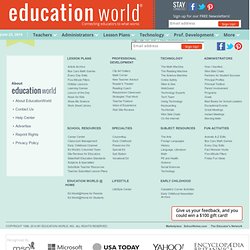
Few, however, gleefully anticipate the actual occasions of that communication. If only we understood each other better! To help, Education World asked the teachers and parents we know, "What do you want your child's teacher -- or your student's parent -- to know about you? " Included: What you should know before and during your parent-teacher conference. A former teacher told me: "When I taught 4th grade, I got a call every night from one parent or another.
At this very moment, elementary school teachers across the country are stampeding toward their local middle and high schools. That might be an exaggeration, of course, but the fact is that many teachers, while fully aware of the importance of effective parent-teacher communication, still dread the actual occasions of that communication. What Parents and Teachers Want Each Other to Know.